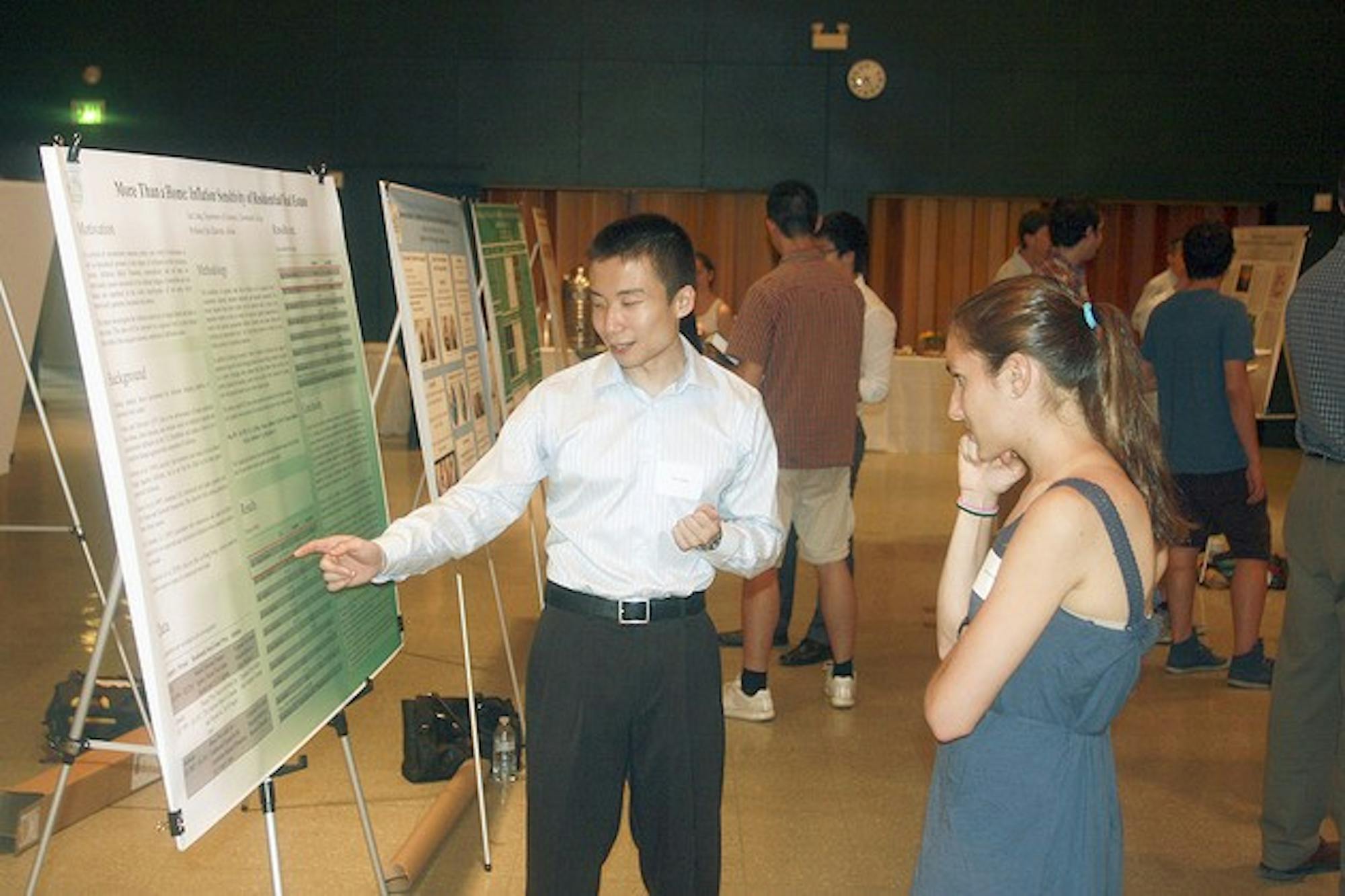Sponsored by the President's Office, the symposium featured 34 students who conducted research in over 20 departments, according to President's Intern Jason Goodman '12.
Participants assembled informal poster presentations to explain the results of their research, enabling the symposium to display a variety of theses in a small group setting, according to Nariah Broadus, director of outreach and project development in the President's Office. The format also facilitated discussion between presenters and attendees.
The original format for showcasing student research work a formal presentation program known as the Academic Gala was less effective because it did not attract underclassmen attendees, nor did it allow participants to fully display the results of their theses, Broadus said. This year's symposium takes the place of the gala, an event that last occurred before College President Jim Yong Kim took office.
"[The symposium] allows for every student to really talk in a personal way about their work and to not feel constrained as much by the format," Broadus said.
Goodman, who proposed the plan for the symposium last spring and has been working on it since, said that the event aimed to honor Dartmouth students' research in an accessible way.
"It's great for the President's Office to acknowledge the fantastic caliber of research that we have at Dartmouth," he said. "It's one of Dartmouth's greatest strengths."
The symposium also afforded seniors the opportunity to practice their presentation skills and become more comfortable sharing information, Goodman said. Not every program or department offers students the opportunity to present to a wide audience, and the symposium was able to serve that function, he said.
Underclassmen who attended the symposium could benefit from the flexibility of its format and exposure to samples of different research types, permitting them to focus on projects aligning with their areas of interest, Goodman said. The informal presentation structure also encouraged students to ask questions and learn from those who have completed a thesis in a particular field, he said.
"I'm excited to have the diverse representation," Goodman said. "It's really rare to have all of that at the same time in the same room."
The symposium also attempted to raise awareness about research opportunities at the College, given that students are often uninformed, according to Assistant Dean of Faculty for Undergraduate Research Margaret Funnell, who was involved in the symposium's creation.
"It's something that Dartmouth does really well, and we don't promote it as much as we should," she said. "It's great to get the word out."
Seniors who took part in the symposium said they appreciated the chance to share their work with a wider audience.
Psychology major and education minor Rebecca Gotlieb '12 whose thesis explored the effects of identity-related stigmas on performance in math and working memory tasks said that presenting to other students and fielding questions allowed her to attain an outside perspective on her project.
"You can get so wrapped up in your research and so committed to thinking in that way that it can be helpful to hear the questions of people who haven't had their heads buried so deeply in it," she said.
Sanela Muharemovic '12 an economics and government double major whose thesis examined the impact of the International Criminal Tribunal for the former Yugoslavia on reconciliation efforts between Bosnia and Herzegovina said that the symposium was an opportunity to engage with other students and encourage them to pursue their academic interests.
"I hope they will learn something new and something interesting," she said. "I also hope people will come forward with questions about how to work on a thesis or on such a major project in general and I hope that I can give them good advice."
Muharemovic said she thinks the symposium should be held again in the future, as it allows students to inspire others and learn from each other.
"We are great resources for each other," she said. "We can have great opportunities to put our talents to work and discover something that is meaningful and that can be used."
Scott O'Brien '12, a classical languages and literatures major whose thesis discussed the function of moral agency in the tragedy genre, said he took part in the symposium to showcase a department with research opportunities that are less-known among students.
Although he said the poster format could "use a little adjustment" because it is not particularly conducive to displaying humanities projects, O'Brien noted that the symposium succeeds in bringing together students from across campus and honors their achievements.
"I think it's a great thing because we work really hard on these things," he said. "There doesn't seem to be something that really shows everybody on campus what it's like, and it's a good thing for undergraduates to see."
The Undergraduate Research Symposium is part of Undergraduate Research Week, which also includes the Karen E. Wetterhahn Science Symposium on May 24 and the Arts at Dartmouth Awards Ceremony on May 29.




